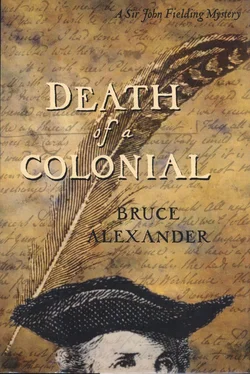Bruce Alexander - Death of a Colonial
Здесь есть возможность читать онлайн «Bruce Alexander - Death of a Colonial» весь текст электронной книги совершенно бесплатно (целиком полную версию без сокращений). В некоторых случаях можно слушать аудио, скачать через торрент в формате fb2 и присутствует краткое содержание. Год выпуска: 1999, ISBN: 1999, Издательство: Putnam Adult, Жанр: Исторический детектив, на английском языке. Описание произведения, (предисловие) а так же отзывы посетителей доступны на портале библиотеки ЛибКат.
- Название:Death of a Colonial
- Автор:
- Издательство:Putnam Adult
- Жанр:
- Год:1999
- ISBN:9780425177020
- Рейтинг книги:3 / 5. Голосов: 1
-
Избранное:Добавить в избранное
- Отзывы:
-
Ваша оценка:
- 60
- 1
- 2
- 3
- 4
- 5
Death of a Colonial: краткое содержание, описание и аннотация
Предлагаем к чтению аннотацию, описание, краткое содержание или предисловие (зависит от того, что написал сам автор книги «Death of a Colonial»). Если вы не нашли необходимую информацию о книге — напишите в комментариях, мы постараемся отыскать её.
Death of a Colonial — читать онлайн бесплатно полную книгу (весь текст) целиком
Ниже представлен текст книги, разбитый по страницам. Система сохранения места последней прочитанной страницы, позволяет с удобством читать онлайн бесплатно книгу «Death of a Colonial», без необходимости каждый раз заново искать на чём Вы остановились. Поставьте закладку, и сможете в любой момент перейти на страницу, на которой закончили чтение.
Интервал:
Закладка:
The Lord Chief Justice was taken somewhat aback. He said nothing for a moment, taking time to consider the situation. Then did he finally offer this: “I wish I trusted any of my servants as you trust him.”
To which Sir John replied: “Jeremy is not a servant.”
“Oh? What, then? I thought …” Indeed, we never learned what he thought, for he never permitted himself to say.
Sir John gave him sufficient opportunity to finish the sentence. But having waited ample time, he said simply, “Jeremy is something more.”
What that ‘something more’ might have been he did not specify, yet my heart soared so high as he said it, I could not possibly have wished him to be more explicit.
“Ah, yes, well, mmm — hmm, I see,” said the Lord Chief Justice, “well, then, Sir John, I shall see you in three days — Wednesday, that is — at three. I shall depend upon you to ask most of the questions of this fellow.”
During that space of time, Sir John Fielding made special preparations for the coming of the claimant. Letters were written, and were delivered or posted. An invitation was extended. But for the most part, Sir John made ready by spending long periods of time alone. No sooner was he done with his court than he would set off pacing the long corridor which led from the Bow Street door as far back as the door to his chambers. As he walked, he muttered, and as he muttered, he moved his head this way and that, nodding it and shaking it, altering his expression according to the flow of his thoughts. Mr. Fuller, the gaoler, remarked upon it. Mr. Marsden, the clerk, ignored it. I, who knew something of what was passing through his mind, sought on a number of occasions to read Sir Johns lips, or puzzle through the encrypted rumblings generated within his voice box. All I did ultimately gain from such efforts were a few words, particularly an oft-repeated “Who? who? who?” and a variety of names, such as Bolt, Mudge, Inskip, Fowlkes, some of which I was not then familiar with.
Nor was he more communicative during the evenings. He reserved himself from talk at table and then often failed to respond when he was spoken to. And afterward, during the three evenings preceding the meeting at the residence of the Lord Chief Justice, he sequestered himself in his study (which was not unusual) and closed the door (which was). Altogether, he was as near completely absent from us as I have ever known him to be.
On the appointed day, however, his mood seemed to change. With no apparent cause, he began speaking when spoken to, commenced smiling once again, and left off pacing and muttering to himself. Nevertheless, he did in no wise allow the matter of his coming interrogation of the claimant to be discussed with him. That I know quite certain, for I tried twice to bring the matter up to him. The first occasion occurred in midmorning. I encountered him discussing the day’s docket with Mr. Marsden. When he had done, I stepped forward and asked, would he be dictating a memo in preparation for the interview at three. (This he often did on such weighty occasions in order to organize his thoughts.) Sir John declined, saying simply that he believed there would be no need. On the second occasion, I was surprised when he told me to be ready for an early departure: We would be leaving at two and allowing ourselves an hour to reach Bloomsbury Square by hackney coach.
“Is that not a great deal of time for a trip so short?” I asked him. “We can get there by foot in less than half that.”
“As it happens,” said he, “we will be traveling to the post coach house to meet one who will be traveling here from Oxford.”
“Oh? And who will that be, sir?”
“That will be revealed to you in due time. “
In fact, the name of the mysterious traveler was given me when we arrived at the coach house. Richard Inskip it was, but at that time the name alone meant nothing to me. I vaguely recalled it as one of those he had conjured with as he paced the long corridor behind the courtroom at Number 4 Bow Street. Yet I knew not what part Mr. Inskip was to play in the days proceedings, and so to have his name alone meant nothing to me.
“Just go and look for him,” said Sir John to me. “If the Oxford coach is in, just call out his name and that should be sufficient to alert him. I shall wait for you to bring him here.”
So it was done. An inquiry to the dispatcher made it clear that the Oxford stagecoach had arrived — or was indeed arriving as he spoke. He pointed it out to me as it entered the coach yard and showed me then where it would come to a halt.
I was thus waiting when the driver reined in his team, and a lad younger than myself leapt forward and threw open the coach door.
“Richard Inskip!” I repeated the name as the passengers descended from the coach. At first, it seemed that Mr. Inskip was not aboard. But then one, an old man he was, who had passed me by, returned and thrust his face at mine.
“What name did you call out?” he asked. “I fear I’m a bit hard of hearing.”
I said the name once again, and he nodded, satisfied. “I am he.”
“Sir John Fielding awaits you nearby,” said I. “If you will just come this way …” I relieved him of his portmanteau, and with my free hand I took his elbow and guided him through the crowd toward the coach.
He was indeed quite an old man — well over seventy, he seemed to be. Yet others who were older might seem younger than he. His skin, wrinkled and spotted, seemed thin as paper. He moved somewhat falteringly, so that I judged it necessary to slow my steps to accommodate his own. Still, there was something youthful in the eager expression he wore as he looked about him. Clearly, he felt great excitement to be in London.
Having reached the hackney coach, I threw open the door, helped him inside, and handed up his portmanteau to the driver.
“Where to now?” the driver called down to me.
“Bloomsbury Square,” said I.
Our destination was no great distance from the coach house, but it being the middle of the day, there were many coaches and dray wagons upon the streets and roads of the city, and as a result we made slow progress on our way to the meeting. As we went, my two fellow passengers discussed what lay ahead. It was soon apparent that Mr. Inskip, a rather humble individual, was distressed that he might in some manner disappoint the august gentlemen who made up the commission, Sir John would hear none of that.
“Absolutely not, Mr. Inskip,” said he. “Why, let me assure you, sir, that you have more true knowledge at your command than all the rest of us together.”
“But such personages as yourself, the Lord Chief Justice, the Solicitor-General — why, a man of my estate might never meet one such in his lifetime.”
“Nonsense. I would wager you have taught your share of dukes and earls in the course of your career.”
“In a way, I have, it’s true, but they were mere lads — noblemen, as it were, in the potential. Not the same thing at all.”
I had learned a bit more about Richard Inskip from that brief exchange. He was not only from Oxford, he was of the university. Yet he was much more modest in his demeanor than any of the professors there — or so I gathered from the tales of the faculty which I had heard. Were it not for his advanced years, I would have assumed Mr. Inskip to be in some junior position in the faculty.
They continued on a bit in just such a way. From further hints that were dropped, I learned that Mr. Inskip had been recruited by Sir John as an interrogator, that he was unknown to the claimant but had been well acquainted with Lawrence Paltrow at the time of the latter’s attendance at the university. The two men discussed some of the details of the questions which Mr. Inskip proposed to put to the claimant — yet these were quite beyond me, for they dealt with matters of science which were then (as now) quite unknown to me.
Читать дальшеИнтервал:
Закладка:
Похожие книги на «Death of a Colonial»
Представляем Вашему вниманию похожие книги на «Death of a Colonial» списком для выбора. Мы отобрали схожую по названию и смыслу литературу в надежде предоставить читателям больше вариантов отыскать новые, интересные, ещё непрочитанные произведения.
Обсуждение, отзывы о книге «Death of a Colonial» и просто собственные мнения читателей. Оставьте ваши комментарии, напишите, что Вы думаете о произведении, его смысле или главных героях. Укажите что конкретно понравилось, а что нет, и почему Вы так считаете.












